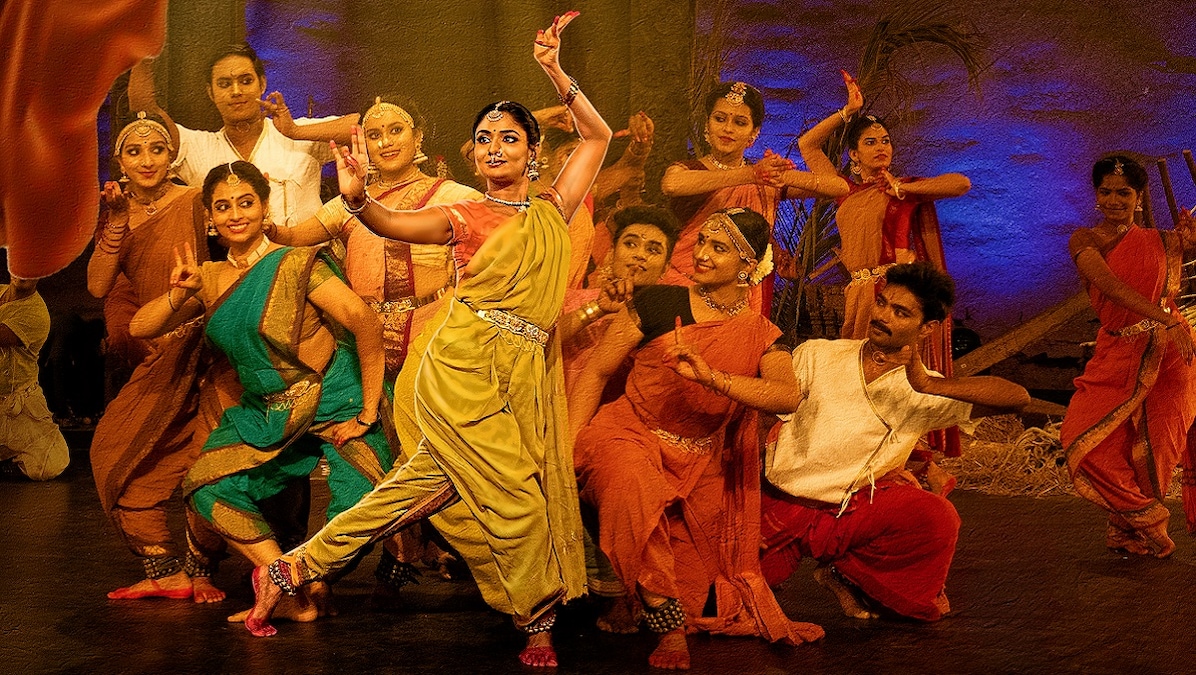Natyam movie review: Where dance is used as a vehicle to tell a gripping story and shun superstitions
Director Revanth Korukonda's debut is a credible, earnest attempt at making an engaging film centring around classical dance,
Oct 22, 2021

Natyam
Story:
Natyam is a village synonymous with tradition and art, doing yeoman service in taking the legacy of classical dance forms forward. Sithara (Sandhya Raju) learns dance from one of the most eminent gurus in the village (Adithya Menon), whose wife Shalini's (Rukmini Vijayakumar) untimely death has been haunting him for many years now.
Shalini's death is linked to a pre-independence era legend surrounding a female dancer Kadambari. Inspired by her life and sacrifices, Sithara is keen to bring Kadambari's story alive through a dance presentation. The film revolves around the many roadblocks she faces to accomplish her aim and how a western dancer Rohit (Rohit Behal) comes to her rescue.
Analysis:
History tells us that films and classical dance are known to have shared a symbiotic connect since the 1930s and there's ample proof to suggest how this association has also helped shape storytelling paradigms in Telugu cinema. Even looking at this minus all the sentimentality, it's still baffling how mainstream cinema in the last few decades has distanced itself from its roots and identity with the excuse of catering to the masses. Natyam, marking Kuchipudi dancer Sandhya Raju's debut in Telugu cinema, reiterates how classical dance can still add so much sheen and flavour to cinema.
This dance-centric film's primary advantage is its protagonist's affiliation with classical dance, there's no question about the authenticity in the setting at all. One of its very first sequences, where a guru is talking to his disciple, emphasises that the primary purpose of dance is to tell a story. The film begins well with an arresting performance of Sandhya Raju and Kamal Kamaraju (in the role of Hari), set to the Ardha Nariswara Stotram, besides the compelling pre-independence era backstory (that tells why the village is named Natyam) and the mystery surrounding the tale of Kadambari.
The scenic dance school backdrop, with all its serenity, is a sight for sore eyes and also lays the foundation for the 'east meets west' romance between the lead pair. The idea of a western dancer (Rohit) seeking inspiration from classical dance for a competition is slightly predictable and simplistic though. The conflict between Hari (the son of a dance guru), Sithara and Rohit over their contrasting approaches to dance is absorbing. You're glued to the screens because of the multi-layered story and earnestness in the treatment.
The pre-interval song about Radha and Krishna's eternal love is exquisitely shot and transports you into a fantasy world. The number is smartly used as a tool to depict Sithara gradually falling for the antics of Rohit. One of the film's more relevant stretches also addresses the nuisance of fringe groups in the name of protecting our traditions. The second hour loses momentum to an extent while shifting to an urban backdrop and the intensity goes for a toss. There's an attempt to weave in humour, showcasing Sithara's efforts to learn western dance, which is ineffective.
The film preserves its best dance segment for the climax, where Kadambari's stellar efforts to preserve the art form are brought to light with Sandhya Raju's remarkable choreography. The love story between a British officer and a classical dancer in the piece is retold beautifully. The modern-day love triangle too adds bite to the drama and helps Natyam end on a high.
The director Revanth Korukonda has impressive clarity with his plot and doesn't clutter his screenplay with any forced cinematic liberties. The dance items are used to take the story ahead and aren't merely an excuse to showcase Sandhya Raju's proficiency with the form. The attempt to use dance as a tool to shun superstition is certainly appreciable. He does a credible job in simplifying the film's essence for a common man without diluting the plot.
Natyam, as a film, is also attuned to the several changes within the guru-shishya tradition. The dance guru here sees the art form more as a means to ensure social consciousness. The guru (in the film) gets the reverence he deserves. Yet, he is no authoritarian and also listens to the voice of his pupil. A later sequence also talks of the need for classical dance to be more accessible to one and all, minus the fuss about 'legacy' and 'grammar'. The director tells his story with simple, sensible dialogue with a pinch of humour.
If Rohit Behal and Sandhya Raju charm us with their dance moves, the solid supporting cast with names like Kamal Kamaraju, Adithya Menon and Subhalekha Sudhakar are its unsung heroes. Sandhya Raju's submission to the role is quite evident though she needs to work more on her screen presence. Yet, this is an assured debut for the dancer.
It's disappointing and ironic that Bhanupriya, whose dance credentials need no introduction, is reduced to a minuscule role of a concerned mother (who has little to do with the plot). Rukmini Vijayakumar is only seen in a blink-and-a-miss appearance. Shravan Bharadwaj's background score is one of the film's assets and brings a lot of emotional depth to sequences at crucial junctures, particularly the climax.
Verdict:
Natyam is a commendable effort chronicling the many conflicts in the life of a dancer. The film is earnest in its storytelling and is peppered with adequate entertainment to keep audiences invested in the proceedings. The dance items are, of course, the major takeaways. Sandhya Raju makes an assured debut in Telugu cinema while being ably supported by Rohit Behal, Adithya Menon, Kamal Kamaraju. This one has its heart in the right place and is worthy of your time!
Share
Where To Watch